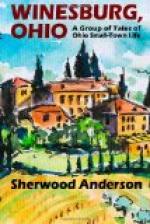She only wanted him to go into town for groceries and as soon as she had told him what she wanted began to scold. “You’re always puttering,” she said. “Now I want you to hustle. There isn’t anything in the house for supper and you’ve got to get to town and back in a hurry.”
Ray went into his own house and took an overcoat from a hook back of the door. It was torn about the pockets and the collar was shiny. His wife went into the bedroom and presently came out with a soiled cloth in one hand and three silver dollars in the other. Somewhere in the house a child wept bitterly and a dog that had been sleeping by the stove arose and yawned. Again the wife scolded. “The children will cry and cry. Why are you always puttering?” she asked.
Ray went out of the house and climbed the fence into a field. It was just growing dark and the scene that lay before him was lovely. All the low hills were washed with color and even the little clusters of bushes in the corners of the fences were alive with beauty. The whole world seemed to Ray Pearson to have become alive with something just as he and Hal had suddenly become alive when they stood in the corn field stating into each other’s eyes.
The beauty of the country about Winesburg was too much for Ray on that fall evening. That is all there was to it. He could not stand it. Of a sudden he forgot all about being a quiet old farm hand and throwing off the torn overcoat began to run across the field. As he ran he shouted a protest against his life, against all life, against everything that makes life ugly. “There was no promise made,” he cried into the empty spaces that lay about him. “I didn’t promise my Minnie anything and Hal hasn’t made any promise to Nell. I know he hasn’t. She went into the woods with him because she wanted to go. What he wanted she wanted. Why should I pay? Why should Hal pay? Why should anyone pay? I don’t want Hal to become old and worn out. I’ll tell him. I won’t let it go on. I’ll catch Hal before he gets to town and I’ll tell him.”
Ray ran clumsily and once he stumbled and fell down. “I must catch Hal and tell him,” he kept thinking, and although his breath came in gasps he kept running harder and harder. As he ran he thought of things that hadn’t come into his mind for years—how at the time he married he had planned to go west to his uncle in Portland, Oregon—how he hadn’t wanted to be a farm hand, but had thought when he got out West he would go to sea and be a sailor or get a job on a ranch and ride a horse into Western towns, shouting and laughing and waking the people in the houses with his wild cries. Then as he ran he remembered his children and in fancy felt their hands clutching at him. All of his thoughts of himself were involved with the thoughts of Hal and he thought the children were clutching at the younger man also. “They are the accidents of life, Hal,” he cried. “They are not mine or yours. I had nothing to do with them.”




